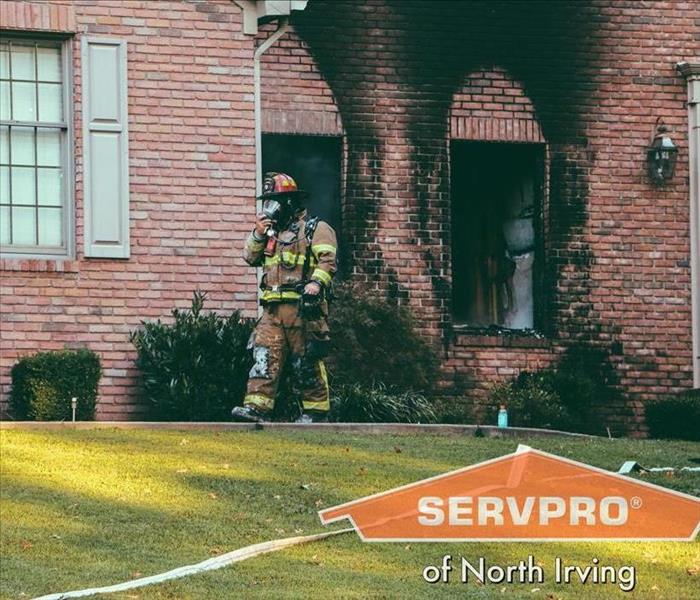Tips to Reduce Your Household Fire Risk
10/11/2021 (Permalink)
 If you or a family member have been affected by a house fire, call the fire restoration specialists at SERVPRO for an immediate response.
If you or a family member have been affected by a house fire, call the fire restoration specialists at SERVPRO for an immediate response.
According to the National Fire Protection Association, about 25% of fire-related deaths result from fires in homes. Every year, thousands of people die, and many more are injured because they did not know how to escape a house fire.
The number one cause of death in home fires is due to smoke inhalation; this can be prevented by having an exit plan and practicing good safety measures.
If you need immediate assistance from fire damage, SERVPRO North Irving’s fire damage restoration experts are here to help and available 24/7. Call our North Irving location at (972) 986-7677 for an immediate response.
Here are four tips to help reduce the risk of house fires.
#1: Regularly Test Smoke Alarms
Smoke alarms play a key role in reducing the risk of death or injury from fires. Studies have shown that more than 50% of all homes had no smoke alarms, and nearly 30% of those with smoke alarms had either none or were non-functioning.
Most home fire deaths occur between 10 p.m. and 6 a.m. when people are most likely to be asleep. Smoke alarms provide the earliest warning of fire, giving you additional time for escape.
Your home should have smoke alarms on every level, both inside and outside bedrooms, in hallways near all sleeping areas, and where one travels through the home exiting. Put in fresh batteries once a year and test them monthly. If your alarm is more than ten years old, you should replace it with a smoke alarm with a sealed-in battery feature.
Read more on Fire Damage Emergency Tips
#2. Check Heating Sources for Problems
Fried foods, malfunctioning appliances, and other high-heat sources are a fire hazard to your home. Check the heating systems for any wear or damage. You may need to have someone inspect your furnace.
Make sure all electrical cords are in good condition and kept away from hot surfaces. Don’t overload sockets with oversized plugs or block them with furniture.
Do not leave anything on stovetop burners when you go to sleep. If your oven goes out, do not use it as a substitute for the oven by using pots and pans on its surface. Always keep flammable items away from heat sources, such as fireplaces and space heaters.
#3. Store Flammable Items Away
There are everyday household items with high flammability levels, such as upholstered furniture, curtains, bedding, and clothing. Always keep these away from heat sources.
Keep your fireplace grate cleaned so it can do its job to reduce fires in your home. Store firewood at least twenty feet away from your home. If you must use flammable liquids for cleaning or other tasks, be sure to use them only in well-ventilated areas and properly dispose of them when done.
#4. Create an Escape Plan and Practice It
Developing an escape plan for every household member will help ensure everyone can get out safely in case of a home fire. When creating an exit plan, consider the following:
- Where am I? What do I need from my bedroom or other parts of the house?
- Which way will I exit my home? Will this be by a stairway on the side of the house, a fire escape on the back, or through my front door?
- How can I get out safely? What am I going to do if there is smoke in the hallways or stairwells?
- Where am I going once outside? How will I get there and how long will it take me to get there?
- Is it safe for me to stay? If you live in a high-rise building, would it be safer to "wait out" the fire from your balcony or fire escape?
Practice your escape plan at least twice a year and ensure everyone is accounted for after each practice.
Respond Quickly to Any Fire Disaster with On-site Mitigation Services
Timely and straightforward preventative measures can go a long way in protecting your loved ones and reducing the risk of house fires.
If you or a family member have been affected by a house fire, call the fire restoration specialists at SERVPRO of North Irving for an immediate response. We will help return your home to pre-fire condition as quickly as possible and with minimal disruption to your day-to-day activities. Call (972) 986-7677.






 24/7 Emergency Service
24/7 Emergency Service